Discovery Weekend at ATD’s International Centre
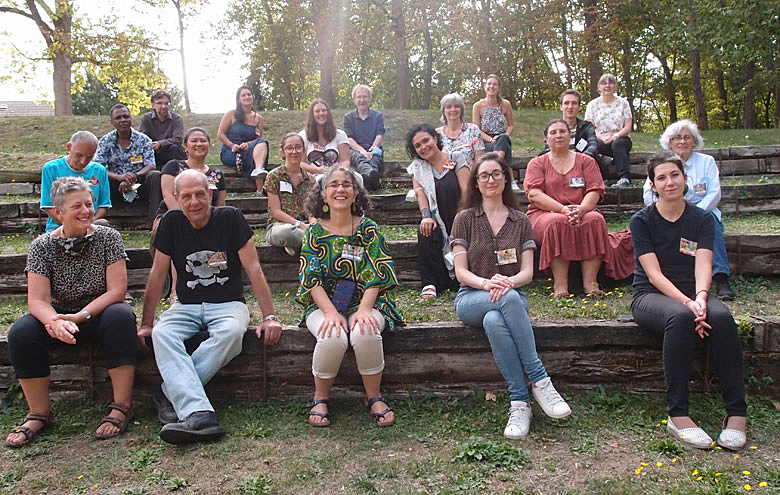
As part of ATD Fourth World’s global outreach, a group from Bulgaria visited ATD’s International Centre in France. The goal of this September 2020 ATD Discovery Weekend was to discover the International Centre and its activities and significance to ATD. Due to Covid-19 groups from ATD United Kingdom didn’t come. But the Bulgarian group did, so as to have a better understanding of ATD Fourth World.
The group of nine from different backgrounds was united by the conviction that extreme poverty can be eliminated. Each person works locally for the dignity of all starting with those often overlooked.
The three day visit was filled with discussions, workshops, and meeting ATD Volunteer Corps members. The group encountered people from all over the world with years of ATD experience.
Presentation and introduction
The weekend started with an outdoor gathering and participants introducing themselves through an object important to them.
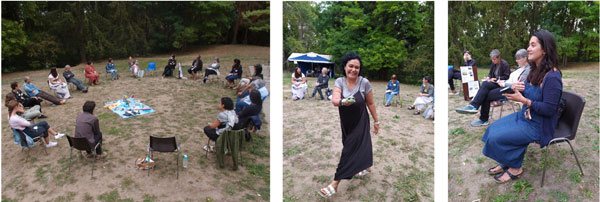
“I liked the circle gathering. Everyone presented their favourite object. Jean showed an axe and that made me think: Yes we need words, discussions are a great way to find solutions, but in the end, physical work is also necessary–going here and there, planting vegetables and trees, cooking, building houses… Maybe we should all engage not only our brains and words, but also our muscles. We have to work hard, without losing our enthusiasm and hopes, to always remember that we are all human…”.
Workshops
The first day included three workshops. The first, a travelling exhibition of 16 small square panels, had the theme “The Philippines and the condition of those fighting extreme poverty”. The Bulgarian group added their contribution to the exhibition as others from different countries had already done.
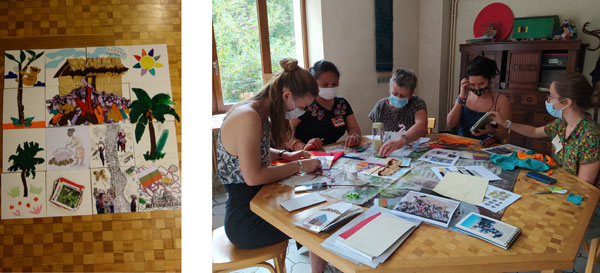
“I participated in the Philippines workshop. I learned some interesting facts about the country from the wonderful Marjorie. Everybody contributed with a small work of art adding to the exhibition.”
The second workshop was making a Kamishibaï, a theatrical tool used in ancient Japanese traditions to tell stories.
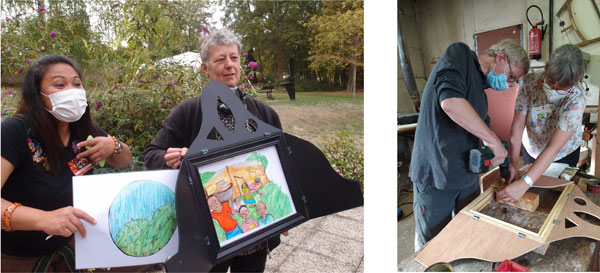
“We worked on making two wooden Kamishibaïs. We brought one back to Bulgaria to use with the children in our weekly activities in Sofia. The next step is to prepare stories with them.”
The third was a gardening workshop.
“People often underestimate this type of activity, although it provides an important and tangible experience.”
An international evening finished the first day, with songs and dances from the world over. The evening was a journey from Peru to Madagascar, then to Bulgaria. In the Bulgarian portion, all took part in traditional dances.
An exhibition and meeting early Volunteer Corps members
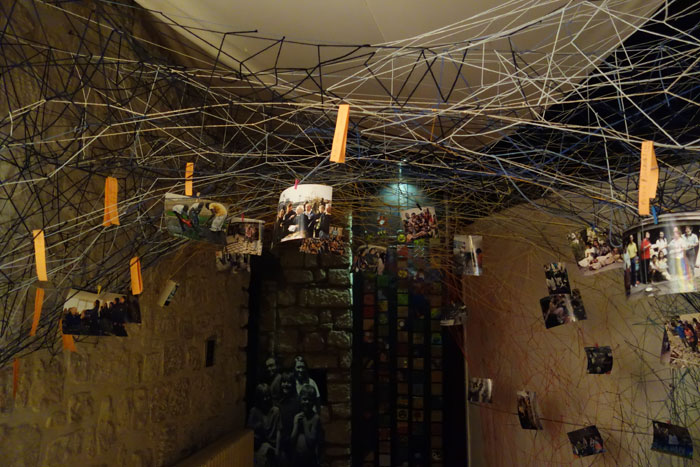
Some participants found the exhibition “We are Legacy” extremely impressive. The multi-sectioned exhibition recreated the many aspects of poverty. “We are Legacy” demonstrates poverty’s affects on people who live and oppose it on a daily basis. It also shows the strength and conviction that overcoming poverty is possible if we work together. The exhibition shows that people have been combating extreme poverty and marginalization for hundreds of years and that this struggle is open to all.
After “We are Legacy”, the group met two of the first Volunteer Corps members. This free flowing and open discussion let the group discover ATD’s history in an informal setting.
“The meeting with the first Volunteers was truly inspiring. I felt respected and I wanted to be like them, to do everything they were able to do, and even more so if I could, to help, to educate, to care for others, to fight with institutions, to seek prosperity and dignity for all. I would like to remain available 24 hours a day, thinking about how to contribute, how to be useful, how to show more love and understanding…”.
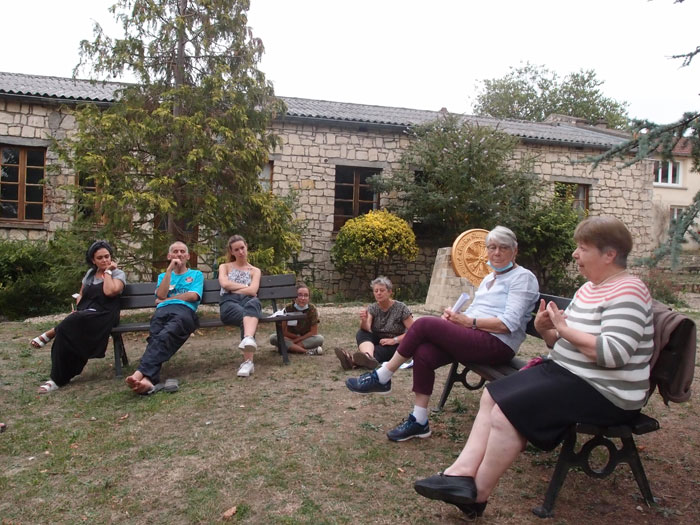
The hidden dimensions of poverty
As part of the visit, the Bulgaria group learned about ATD’s report entitled The Hidden Dimensions of Poverty. This report with teams in Bangladesh, Bolivia, France, Tanzania, the United Kingdom and the United States was undertaken so as to have a better understanding of the multidimensional aspects of poverty. The main objective was to identify the key dimensions of poverty and how they interrelate. The results of this study were presented by members of the research team in France. The team included four people living in poverty and a Volunteer Corps member. A discussion followed on the question: do the different dimensions of poverty exist in Bulgaria and what are solutions to them?
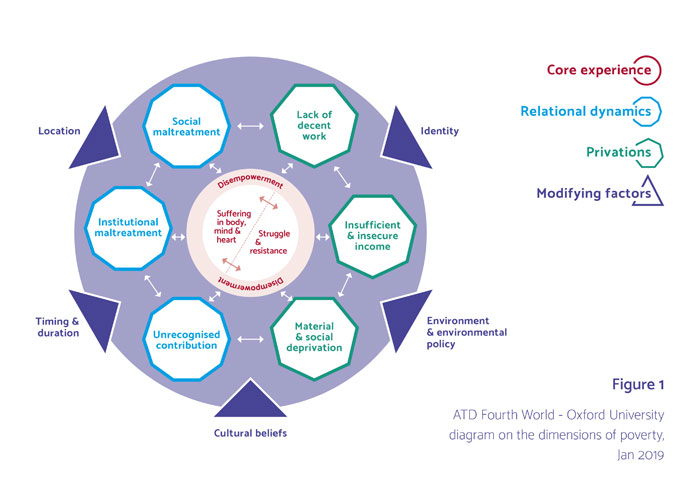
“The discussion was very interesting. New questions and ideas emerged. I realised that just because we don’t see a problem doesn’t mean it doesn’t exist. We have to constantly update our working methods and search for the truth in the society we live in.”

“We all need to seriously rethink our approach to poverty.”
More on The Hidden Dimensions of Poverty research.
Human rights and extreme poverty
The group also learned about the United Nations adopted “Guiding Principles on Extreme Poverty and Human Rights”. The Guiding Principles help countries on the issue of extreme poverty. In order to support implementation, the UN created a handbook “Making Human Rights a Reality for People Experiencing Extreme Poverty”. The handbook uses proposed principles with the aim of supporting non-governmental organisations, local activists and institutions in the fight against extreme poverty.
Based on the handbook and drawing from those living in extreme poverty, this workshop looked for ways that the Guiding Principles could be applied in a new context, for example how to go from local action to advocacy that leads to policy and strategy change at a national level.
“It is important to make children more sensitive to the issue, to change the education system, to give everyone the opportunity to express themselves in relation to human rights. We have to change the system; independent action would not have any impact.”
Based on experiences presented in the handbook, it is possible to feel that each of us can have overlooked abilities. These abilities need to be developed through activities.
An important part of the process is empowering people. This means creating spaces where meeting and participating together takes place.
More on the handbook.
Download the handbook.
A visit to the Human Rights Plaza in Paris
A few days before October 17, World Day for Overcoming Poverty, the group had the opportunity to visit the commemorative stone in honour of the victims of poverty. The commemorative stone is located at the Human Rights Plaza in Paris. The commemorative stone pays tribute to the victims of hunger, ignorance, and violence and brings together those who believe that poverty is not inevitable. The stone has exceptional strength and meaning for those fighting extreme poverty and is extremely important to them. Commemorative stone replicas are found worldwide and are an iconic venue for celebrating the World Day to Overcome Poverty. They also honour lives lost to poverty. Replica locations acknowledge the spirit and meaning of October 17 with visits by a growing number of people who believe that poverty is not inevitable.
Conclusion
The group had three intense days of shared stories and experiences. Those that came learned much more about ATD Fourth World’s history and activities than they knew before.
Many now share the same ideals and plenty of new conversation topics were discovered.
ATD Bulgaria will continue its activities stronger than ever, with an even greater connection to ATD’s international outlook. These activities will find allies and friends in the fight against poverty.

